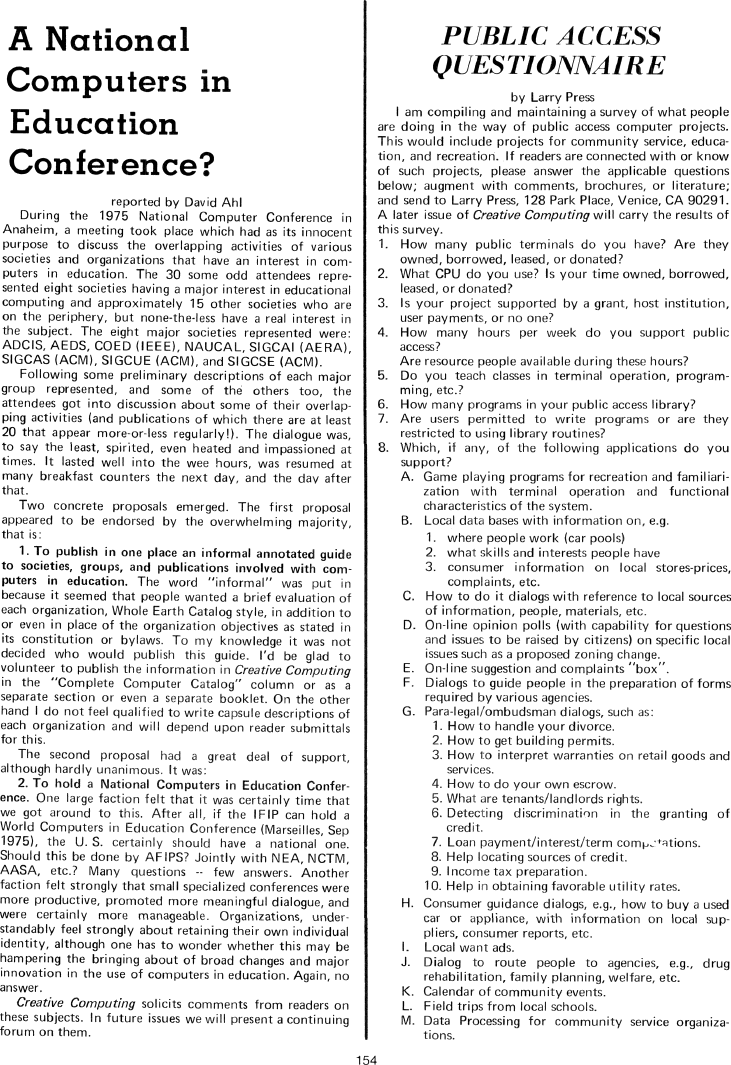The Best of Creative Computing Volume 1 (published 1976)
A National Computers in Education Conference?

A National Computers in Education Conference?
reported by David Ahl
During the 1975 National Computer Conference in Anaheim, a meeting took place
which had as its innocent purpose to discuss the overlapping activities of
various societies and organizations that have an interest in computers in
education. The 30 some odd attendees represented eight societies having a major
interest in educational computing and approximately 15 other societies who are
on the periphery, but none-the-less have a real interest in the subject. The
eight major societies represented were: ADCIS, AEDS, COED (IEEE), NAUCAL, SIGCAI
(AERA), SIGCAS (ACM), SIGCUE (ACM), and SIGCSE (ACM).
Following some preliminary descriptions of each major group represented, and
some of the others too, the
attendees got into discussion about some of their overlapping activities (and
publications of which there are at least 20 that appear more-or-less
regularly!). The dialogue was, to say the least, spirited, even heated and
impassioned at times. It lasted well into the wee hours, was resumed at many
breakfast counters the next day, and the day after that.
Two concrete proposals emerged. The first proposal appeared to be endorsed by
the overwhelming majority, that is:
1. To publish in one place an informal annotated guide to societies, groups,
and publications involved with computers in education. The word 'informal" was
put in because it seemed that people wanted a brief evaluation of each
organization, Whole Earth Catalog style, in addition to or even in place of the
organization objectives as stated in its constitution or bylaws. To my knowledge
it was not decided who would publish this guide. l'd be glad to volunteer to
publish the information in Creative Computing in the "Complete Computer Catalog"
column or as a separate section or even a separate booklet. On the other hand I
do not feel qualified to capsule descriptions of each organization and will
depend upon reader submissions for this.
The second proposal had a great deal of support, although hardly unanimous.
It was:
2. To hold a National Computers in Education Conference. One large faction
felt that it was certainly time that we got around to this. After all, if the
IFIP can hold a World Computers in Education Conference (Marseilles, Sep 1975),
the U.S. certainly should have a national one. Should this be done by AFIPS?
Jointly with NEA, NCTM, AASA, etc.? Many questions -- few answers. Another
faction felt strongly that small specialized conferences were more productive,
promoted more meaningful dialogue, and were certainly more manageable.
Organizations, understandably feel strongly about retaining their own individual
identity, although one has to wonder whether this may be hampering the bringing
about of broad changes and major innovation in the use of computers in
education. Again, no answer.
Creative Computing solicits comments from readers on these subjects. In
future issues we will present a continuing forum on them.
***
PUBLIC ACCESS QUESTIONNAIRE
by Larry Press
I am compiling and maintaining a survey of what people are doing in the way
of public access computer projects. This would include projects for community
service, education, and recreation. If readers are connected with or know of
such projects, please answer the applicable questions below; augment with
comments, brochures, or literature; and send to Larry Press, 128 Park Place,
Venice, CA 90291. A later issue of Creative Computing will carry the results of
this survey.
1. How many public terminals do you have? Are they owned, borrowed, leased, or
donated?
2. What CPU do you use? Is your time owned, borrowed, leased, or donated?
3. Is your project supported by a grant, host institution, user payments, or no
one?
4. How many hours per week do support public access?
Are resource people available during these hours?
5. Do you teach classes in terminal operation, programming, etc.?
6. How many programs in your public access library?
7. Are users permitted to write programs or are they restricted to using library
routines?
8. Which, if any, of the following applications do you support?
A. Game playing programs for recreation and familiarization with terminal
operation and functional
characteristics of the system.
B. Local data bases with information on, e.g.
1. where people work (car pools)
2. what skills and interests people have
3. consumer information on local stores-prices, complaints, etc.
C. How to do it dialogs with reference to local sources of information,
people, materials, etc.
D. On-line opinion polls (with capability for questions and issues to be
raised by citizens) on specific local issues such as a proposed zoning change.
E. On-line suggestion and complaints "box".
F. Dialogs to guide people in the preparation of forms required by various
agencies.
G. Para-legal/ombudsman dialogs, such as:
1. How to handle your divorce.
2. How to get building permits.
3. How to interpret warranties on retail goods and services.
4. How to do your own escrow.
5. What are tenants/landlords rights.
6. Detecting discrimination in the granting of credit.
7. Loan payment/interest/term computations.
8. Help locating sources of credit.
9. Income tax preparation.
10. Help in obtaining favorable utility rates.
H. Consumer guidance dialogs, e.g., how to buy a used car or appliance, with
information on local suppliers, consumer reports, etc.
I. Local want ads.
J. Dialog to route people to agencies, e.g., drug rehabilitation, family
planning, welfare, etc.
K. Calendar of community events.
L. Field trips from local schools.
M. Data Processing for community service organizations.


